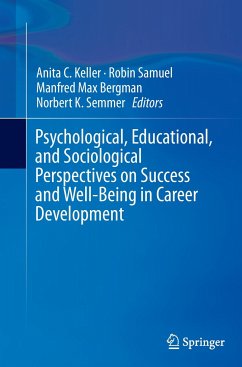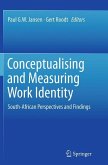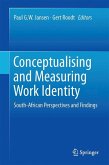Psychological, Educational, and Sociological Perspectives on Success and Well-Being in Career Development
Herausgegeben:Keller, Anita C.; Samuel, Robin; Bergman, Manfred Max; Semmer, Norbert K.
Psychological, Educational, and Sociological Perspectives on Success and Well-Being in Career Development
Herausgegeben:Keller, Anita C.; Samuel, Robin; Bergman, Manfred Max; Semmer, Norbert K.
- Broschiertes Buch
- Merkliste
- Auf die Merkliste
- Bewerten Bewerten
- Teilen
- Produkt teilen
- Produkterinnerung
- Produkterinnerung
This collection covers how success and well-being relate to each other in early career development in the domains of employment and education. It gives a conceptual overview of success and well-being as established in the psychological research tradition, complemented by educational and sociological approaches. The volume presents articles on success and well-being in applied contexts, such as well-being as an individual resource during school-to-work transition, or well-being and success at the workplace. Work psychologists, social psychologists, educational researchers, and sociologists will…mehr
Andere Kunden interessierten sich auch für
![Psychological, Educational, and Sociological Perspectives on Success and Well-Being in Career Development Psychological, Educational, and Sociological Perspectives on Success and Well-Being in Career Development]() Psychological, Educational, and Sociological Perspectives on Success and Well-Being in Career Development77,99 €
Psychological, Educational, and Sociological Perspectives on Success and Well-Being in Career Development77,99 €![Derailed Organizational Interventions for Stress and Well-Being Derailed Organizational Interventions for Stress and Well-Being]() Derailed Organizational Interventions for Stress and Well-Being77,99 €
Derailed Organizational Interventions for Stress and Well-Being77,99 €![Making Career Stories Making Career Stories]() Mark ScillioMaking Career Stories39,99 €
Mark ScillioMaking Career Stories39,99 €![Conceptualising and Measuring Work Identity Conceptualising and Measuring Work Identity]() Conceptualising and Measuring Work Identity77,99 €
Conceptualising and Measuring Work Identity77,99 €![Conceptualising and Measuring Work Identity Conceptualising and Measuring Work Identity]() Conceptualising and Measuring Work Identity77,99 €
Conceptualising and Measuring Work Identity77,99 €![The Many Faces of Health, Competence and Well-Being in Old Age The Many Faces of Health, Competence and Well-Being in Old Age]() The Many Faces of Health, Competence and Well-Being in Old Age116,99 €
The Many Faces of Health, Competence and Well-Being in Old Age116,99 €![Critical Studies in Diversity Management Literature Critical Studies in Diversity Management Literature]() George GotsisCritical Studies in Diversity Management Literature47,99 €
George GotsisCritical Studies in Diversity Management Literature47,99 €-
-
-
This collection covers how success and well-being relate to each other in early career development in the domains of employment and education. It gives a conceptual overview of success and well-being as established in the psychological research tradition, complemented by educational and sociological approaches. The volume presents articles on success and well-being in applied contexts, such as well-being as an individual resource during school-to-work transition, or well-being and success at the workplace. Work psychologists, social psychologists, educational researchers, and sociologists will find this book valuable, as it provides unique insights into social and psychological processes afforded by the combination of disciplines, concepts, and a diversity of approaches.
Produktdetails
- Produktdetails
- Verlag: Springer / Springer Netherlands
- Artikelnr. des Verlages: 978-94-024-0695-5
- Softcover reprint of the original 1st ed. 2014
- Seitenzahl: 208
- Erscheinungstermin: 27. September 2016
- Englisch
- Abmessung: 235mm x 155mm x 12mm
- Gewicht: 323g
- ISBN-13: 9789402406955
- ISBN-10: 9402406956
- Artikelnr.: 45996148
- Herstellerkennzeichnung Die Herstellerinformationen sind derzeit nicht verfügbar.
- Verlag: Springer / Springer Netherlands
- Artikelnr. des Verlages: 978-94-024-0695-5
- Softcover reprint of the original 1st ed. 2014
- Seitenzahl: 208
- Erscheinungstermin: 27. September 2016
- Englisch
- Abmessung: 235mm x 155mm x 12mm
- Gewicht: 323g
- ISBN-13: 9789402406955
- ISBN-10: 9402406956
- Artikelnr.: 45996148
- Herstellerkennzeichnung Die Herstellerinformationen sind derzeit nicht verfügbar.
Anita C. Keller, Dr., is a postdoc researcher at the University of Bern (Department of Psychology). She graduated in Psychology from the University of Bern and worked as a researcher at TREE (Transition from Education to Employment Project, University of Basel) and the University Hospital Basel before she joined the University of Bern. Currently she manages a Swiss Science Foundation project (entitled Individual Trajectories of Working Life in Switzerland) and projects with Health Promotion Switzerland aiming at preventing stress at work. Her main research interests relate to work design, stress at work, success at work, attitudes, well-being, and the self. A special interest lies on the interplay of work characteristics, well-being, and the self over longer time spans and the meaning of changes in working conditions for employees. Robin Samuel, Dr., is currently a visiting scholar at the University of Cambridge (Department of Sociology), an Honorary Fellow at the University of Edinburgh (School of Social and Political Science), and an affiliated researcher at the University of Basel (Social Research and Methodology Group). From 2012 to 2013, he was a visiting scholar at Stanford University (Stanford Center on Poverty and Inequality). He graduated in sociology, sustainable development, and modern history from the University of Basel in 2008, worked as a researcher with Prof. Dr. M. M. Bergman at the Chair of Social Research and Methodology (University of Basel) 2009 to 2012, and obtained a PhD in sociology in 2012. His current research addresses (i) the role of cognitive and noncognitive characteristics for labor market outcomes and social mobility, (ii) over- and underwork against the backdrop of shifts in skill supply and demand, (iii) the gendered interplay between success and well-being, (iv) how habitual factors affect individual energy consumption patterns, and (v) the application of Bayesian statistics tofallacies. Manfred Max Bergman , PhD, is Professor of Social Research and Methodology at the University of Basel, Switzerland. He obtained a BA from the University of California, a Diplôme d'études supérieures from the University of Geneva, and a PhD from the Faculty of Social and Political Sciences at the University of Cambridge, England. Concurrent to his chair at the University of Basel, he holds a fellowship at the Centre for Research on Evaluation, Science and Technology (CREST) as well as the African Doctoral Academy at Stellenbosch University in South Africa. He is currently working on sustainable development in association with education, employment, and organizations. Norbert K. Semmer , PhD, is Professor emeritus of the Psychology of Work and Organizations at the University of Bern, Switzerland. He studied psychology in Regensburg (Germany), Groningen (The Netherlands), and Berlin (Germany). His major areas of interest relate to (1) stress at work, (2) efficiency in work behavior, and (3) human error and its implications for quality and safety. He is Co-Principal Investigator of a large longitudinal study on the transition of young people from vocational training to work (Work Experience and Quality of Life in Switzerland: work, Stress, and Personality Development; ÆQUAS". Semmer has recently developed a concept that focuses on Stress as Offense to Self.
Chapter 1: Introduction; Robin Samuel, Manfred Max Bergman, Anita C. Keller and Norbert K. Semmer.- Chapter 2: The Influence of Career Success on Subjective Well-Being; Andrea E. Abele-Brehm.- Chapter 3: Upper-Secondary Educational Trajectories and Young Men's and Women's Self-Esteem Development in Switzerland; Sybille Bayard, Monika Staffelbach, Phillip Fischer and Marlies Buchmann.- Chapter 4: Young People's Progress after Dropout from Vocational Education and Training: Transitions and Occupational Integration at Stake. Longitudinal Qualitative Perspective; Barbara Duc and Nadia Lamamra.- Chapter 5: Success, Well-Being and Social Recognition: An Interactional Perspective on Vocational Training Practices; Stefano A. Losa, Barbara Duc and Laurent Filliettaz.- Chapter 6: Agentic Pathways toward Fulfillment in Work; Jeylan T. Mortimer, Mike Vuolo and Jeremy Staff.- Chapter 7: The How and Why of the Relationship between Job Insecurity, Subjective Career Success, and Turnover Intention; Cécile Tschopp and Gudela Grote.- Chapter 8: Work Experiences and Well-Being in the First Years of Professional Work in Switzerland: A Ten-Year Follow-up Study; Wolfgang Kälin, Anita C. Keller, Franziska Tschan, Achim Elfering and Norbert K. Semmer.- Chapter 9: The Meaning and Measurement of Well-Being as an Indicator of Success; Anita C. Keller, Norbert K. Semmer, Robin Samuel and Manfred Max Bergman.
Chapter 1: Introduction; Robin Samuel, Manfred Max Bergman, Anita C. Keller and Norbert K. Semmer.- Chapter 2: The Influence of Career Success on Subjective Well-Being; Andrea E. Abele-Brehm.- Chapter 3: Upper-Secondary Educational Trajectories and Young Men's and Women's Self-Esteem Development in Switzerland; Sybille Bayard, Monika Staffelbach, Phillip Fischer and Marlies Buchmann.- Chapter 4: Young People's Progress after Dropout from Vocational Education and Training: Transitions and Occupational Integration at Stake. Longitudinal Qualitative Perspective; Barbara Duc and Nadia Lamamra.- Chapter 5: Success, Well-Being and Social Recognition: An Interactional Perspective on Vocational Training Practices; Stefano A. Losa, Barbara Duc and Laurent Filliettaz.- Chapter 6: Agentic Pathways toward Fulfillment in Work; Jeylan T. Mortimer, Mike Vuolo and Jeremy Staff.- Chapter 7: The How and Why of the Relationship between Job Insecurity, Subjective Career Success, and Turnover Intention; Cécile Tschopp and Gudela Grote.- Chapter 8: Work Experiences and Well-Being in the First Years of Professional Work in Switzerland: A Ten-Year Follow-up Study; Wolfgang Kälin, Anita C. Keller, Franziska Tschan, Achim Elfering and Norbert K. Semmer.- Chapter 9: The Meaning and Measurement of Well-Being as an Indicator of Success; Anita C. Keller, Norbert K. Semmer, Robin Samuel and Manfred Max Bergman.








